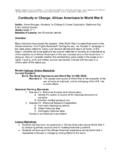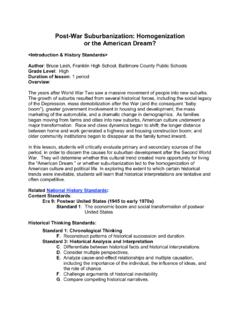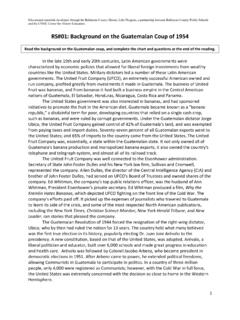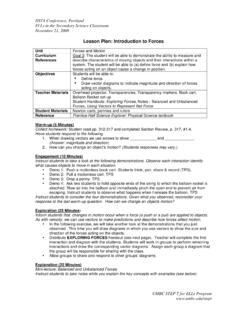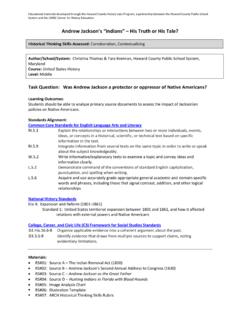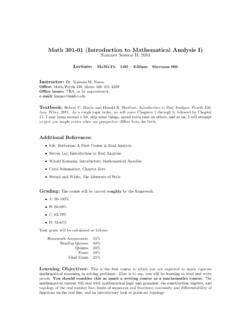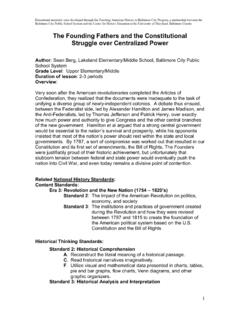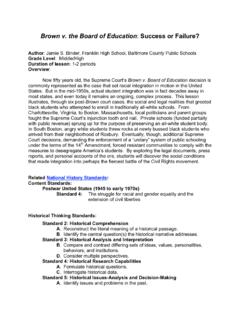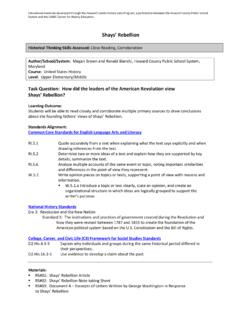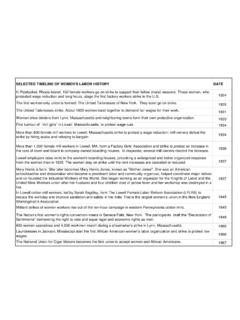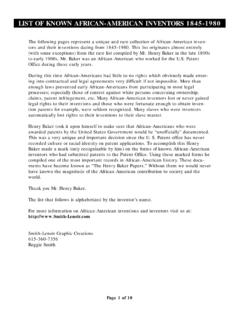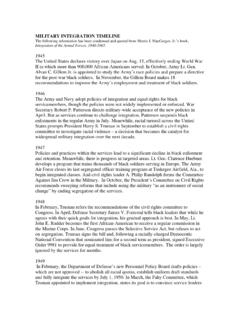Transcription of African Americans and the Democratic Party - umbc.edu
1 African Americans and the Democratic PartyAuthor: Sue Pennington, Wilde Lake High School, Howard County PublicSchoolsGrade Level: Middle/HighDuration of lesson: 2 periodsOverview:Having aligned themselves with the Republican Party since the days ofAbraham Lincoln, what made African Americans switch to the Democrats duringthe Depression Era? This lesson explores why African Americans voted forFranklin Roosevelt, despite the fact that the Democratic Party had traditionallydenied them basic civil rights. Using primary sources and a variety of voicesfrom the period, students can discover how the Depression affected African - american workers, and why black voters switched their allegiance during theperiod.
2 Students will also learn how Democrats and Republicans of the timeresponded to the call for civil rights. Roosevelt s problem was that in order toretain his position of leadership, he had to keep the Southern Democrats whotime and again denied African Americans the vote in their states within theparty. Although Roosevelt made no move to reverse the legal segregation at thetime, he did invite several African - american leaders to serve as advisors to theadministration. He also ensured that African Americans had access to reliefduring the worst days of the Depression. Because of Roosevelt s willingness toengage African Americans as Americans , he won their votes for the DemocraticParty for decades to National History Standards:Content Standards:Era 8: The Great Depression and World War II (1929-1945)Standard 1: The causes of the Great Depression and how itaffected american Thinking Standards:Standard 2: Historical ComprehensionA.
3 Reconstruct the literal meaning of a historical Evidence historical 3: Historical Analysis and InterpretationA. Identify the author or source of the historical document Consider multiple Analyze cause-and-effect relationships and multiple causation,including the importance of the individual, the influence of ideas,and the role of 4: Historical Research CapabilitiesD. Identify the gaps in the available records, marshal contextualknowledge and perspectives of the time and place, andconstruct a sound historical 5: Historical Issues-Analysis and Decision-MakingA. Identify issues and problems in the Evaluate alternative courses of Formulate a position or course of action on an Objectives: Students will identify factors that caused African Americans to shift partyloyalty from the Republican Party to the Democratic Party .
4 Students will review ways in which African Americans benefited from NewDeal programs. Students will analyze primary sources to identify historical perspectives. Students will make predictions about the expectations of AfricanAmericans from the Roosevelt BackgroundIn the Presidential election of 1936, African Americans votedoverwhelmingly for the Democratic Party , and, in particular, for President FranklinD. Roosevelt. However, at the time their vote was not necessarily seen as a votefor the Democrats, but, rather as a vote in support of Roosevelt himself and thepolicies of the New Deal. The movement of African - american voters away fromthe Republican Party was part of a nationwide shift that had arisen in the creationof the so-called Roosevelt Coalition.
5 This national shift would make theDemocrats the majority Party for the next several question of why African Americans shifted their historical allegiance tothe Republican Party in the Depression era raises some interesting a vote for Roosevelt synonymous with economic recovery in the African - american community? Was there an emotional component to this vote? WereRoosevelt and his administration champions of civil rights?Since the conclusion of the Civil War in 1865, African Americans hadvoted primarily with the Republican Party . The Republican Party was the Party ofAbraham Lincoln, the Great Emancipator. After Lincoln s assassination, the so-called Radical Republicans helped to establish the Freedman s Bureau, passedthe Civil Rights Act of 1866, and drafted the Fourteenth Amendment, preventingstates from denying rights to citizens.
6 In 1868, Ulysses S. Grant was electedPresident with the help of Southern African Americans , who were voting in apresidential election for the first time. During Grant s presidency, the RadicalRepublicans introduced and ratified the Fifteenth Amendment, which stated thata citizen s (male only) right to vote could not be denied because of race, color,or previous condition of servitude. African Americans , particularly former slaves,became loyal members of the Republican Reconstruction ended in 1877, Southern Democrats regainedpower and began passing and implementing legal restrictions such as the polltax, literacy tests and grandfather clauses, effectively disenfranchising much ofthe new African - american electorate.
7 In addition, the Southern states passed aseries of Jim Crow laws, which regulated most areas of private and public end of Reconstruction also marked the end of the limited national politicalcourtship of African - american voters. African Americans were either stripped oftheir political rights, as in the South, or, as in the North, their numbers were notlarge enough to affect the outcome of any intolerable conditions in the South spurred a movementnorthward of African Americans during the late nineteenth and early twentiethcenturies, known as the Great Migration. However, discrimination was also a factof life in Northern industrial cities.
8 Covenants limited the housing stock availableto black families and labor unions denied membership to African -Americanworkers. Employers frequently hired blacks only as a last resort. In 1896 theSupreme Court legalized segregation in its ruling in Plessy vs. Ferguson, sayingthat separate but equal facilities did not violate the Fourteenth by law (de jure) in the South, and by custom (de facto) in the North,was entrenched in society and law well into the middle of the twentieth African - american suffrage was secure in the Northern and Westernstates, and small numbers of African Americans were appointed to local publicoffices during the tenure of Theodore Roosevelt, on the whole, blacks possessedlittle political or economic power at the turn of the century.
9 Southerner WoodrowWilson ran on the Democratic ticket for the presidency in 1912 with promises ofaction on civil rights issues, winning the endorsement of the fledgling NationalAssociation for the Advancement of Colored People (NAACP). But once in office,Wilson did little to advance the cause of equal protection for African historians have concluded that his administration s policies, in effect,reinforced segregation within the ranks of the federal government. This lack ofprogress in civil, political and economic rights in the aftermath of World War Oneled to the loss of the African - american vote for the Democrats in the Election of1920, as the black electorate returned to the fold of the Republican Party .
10 AfricanAmericans during the period increasingly united around the issue of civil rightsand anti-lynching legislation, and predominantly-black neighborhoods in majorurban centers began to emerge as cohesive voting blocks that could potentiallyinfluence the outcome of an Election of 1928 signaled the first time since Reconstruction that anational political Party made an organized effort to woo the African -Americanvote. Al Smith, the Democratic presidential candidate and the first Catholicnominee for the office from a major Party , enlisted the help of James WeldonJohnson, the executive secretary of the NAACP, and Walter White, the assistantsecretary, who was on leave from the organization to research a book on thelynching crisis in the United States (Weiss, 9).
